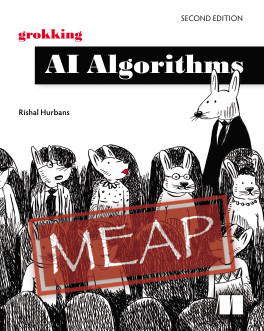pro $24.99 per month
- access to all Manning books, MEAPs, liveVideos, liveProjects, and audiobooks!
- choose one free eBook per month to keep
- exclusive 50% discount on all purchases
- renews monthly, pause or cancel renewal anytime
lite $19.99 per month
- access to all Manning books, including MEAPs!
team
5, 10 or 20 seats+ for your team - learn more

Look inside
Learn Quantum Computing with Python and Q# demystifies quantum computing. Using Python and the new quantum programming language Q#, you’ll build your own quantum simulator and apply quantum programming techniques to real-world examples including cryptography and chemical analysis.
about the technology
Quantum computers present a radical leap in speed and computing power. Improved scientific simulations and new frontiers in cryptography that are impossible with classical computing may soon be in reach. Microsoft’s Quantum Development Kit and the Q# language give you the tools to experiment with quantum computing without knowing advanced math or theoretical physics.about the book
Learn Quantum Computing with Python and Q# introduces quantum computing from a practical perspective. Use Python to build your own quantum simulator and take advantage of Microsoft’s open source tools to fine-tune quantum algorithms. The authors explain complex math and theory through stories, visuals, and games. You’ll learn to apply quantum to real-world applications, such as sending secret messages and solving chemistry problems.what's inside
- The underlying mechanics of quantum computers
- Simulating qubits in Python
- Exploring quantum algorithms with Q#
- Applying quantum computing to chemistry, arithmetic, and data
about the authors
Dr. Sarah Kaiser works at the Unitary Fund, a non-profit organization supporting the quantum open-source ecosystem, and is an expert in building quantum tech in the lab. Dr. Cassandra Granade works in the Quantum Systems group at Microsoft, and is an expert in characterizing quantum devices.Quantum computing is the next big thing and it’s happening now. You will need this book to get ahead of the game.
An excellent introductory book on quantum computing.
A hands-on guide to learning about quantum computing that will have you up and running in no time.
A great introduction to quantum computing with great applications!
choose your plan
team
monthly
annual
$49.99
$499.99
only $41.67 per month
- five seats for your team
- access to all Manning books, MEAPs, liveVideos, liveProjects, and audiobooks!
- choose another free product every time you renew
- choose twelve free products per year
- exclusive 50% discount on all purchases
- renews monthly, pause or cancel renewal anytime
- renews annually, pause or cancel renewal anytime
-
![]() Learn Quantum Computing with Python and Q# ebook for free
Learn Quantum Computing with Python and Q# ebook for free
choose your plan
team
monthly
annual
$49.99
$499.99
only $41.67 per month
- five seats for your team
- access to all Manning books, MEAPs, liveVideos, liveProjects, and audiobooks!
- choose another free product every time you renew
- choose twelve free products per year
- exclusive 50% discount on all purchases
- renews monthly, pause or cancel renewal anytime
- renews annually, pause or cancel renewal anytime
-
![]() Learn Quantum Computing with Python and Q# ebook for free
Learn Quantum Computing with Python and Q# ebook for free
choose your plan
team
monthly
annual
$49.99
$499.99
only $41.67 per month
- five seats for your team
- access to all Manning books, MEAPs, liveVideos, liveProjects, and audiobooks!
- choose another free product every time you renew
- choose twelve free products per year
- exclusive 50% discount on all purchases
- renews monthly, pause or cancel renewal anytime
- renews annually, pause or cancel renewal anytime
-
![]() Learn Quantum Computing with Python and Q# ebook for free
Learn Quantum Computing with Python and Q# ebook for free



















 Learn Quantum Computing with Python and Q# ebook for free
Learn Quantum Computing with Python and Q# ebook for free